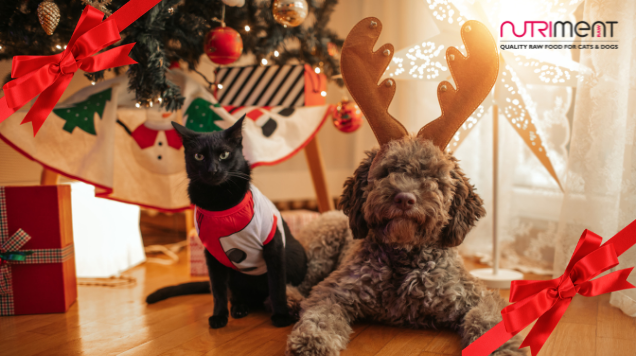Keeping your pets happy and safe at Christmas time

Although it may be hard to believe, Christmas is most certainly just around the corner. The weather is crisping up, the shelves are fully stacked with selection boxes, and we can almost hear the faint jingling of Santa’s sleigh in the distance!
Perhaps most importantly, Christmas is about spending time with loved ones, including those with four legs. However, there are lots of hidden dangers for our pets at this time of year. From poisonous food to toxic plants and choking hazards, it’s incredibly important to know what can pose a risk to your dogs and cats, and how to prevent a dreaded out-of-hours emergency trip to the vets.
Which Christmas human foods are poisonous for dogs?
Many foods and snacks that are popular over the Christmas period are toxic or poisonous for cats and dogs. They’re often left within easy reach as we gather for parties and get-togethers over the festive period. The increased volume of food available within easy reach makes it even more tempting for household pets.
Alcohol, grapes and dried fruits – like those found in Christmas cake, Christmas pudding and mince pies are all highly toxic for pets, as well as treats that contain artificial sweeteners. Chocolate is a well-known human food that is poisonous for pets. In fact, around 20% of all chocolate cases reported to the Veterinary Poisons Information Service (VPIS) occur in December. In addition to this, Christmas dinner ingredients such as onions, leeks and garlic can cause digestive upset for cats and dogs.
Fragrances around the home
Cinnamon, cranberries, pine, nutmeg, amber, clove – there are many scents that remind us of the Christmas season. Commercially available as diffusers, candles, burners and sprays, they’re a seemingly harmless way to satisfy your senses in and around the home during holiday season. Unfortunately, some oils and chemicals used in these types of products can be toxic to pets if they are inhaled, consumed or touched. Products that involve heat can be a burn risk too.
It’s also worth bearing in mind that animals tend to have much more sensitive senses of smells. What may be a mild scent for humans can be overbearing and uncomfortable for pets.
Which Christmas plants are toxic to dogs and cats?
Holly berries, mistletoe, amaryllis, poinsettia, lily, Christmas cactus and Christmas rose are all toxic to dogs and cats, so it is incredibly important to keep these decorative plants out of their reach.
Choking hazards
Whilst dogs and cats can be very intelligent, sometimes the urge to chew and swallow random objects is just too strong! Christmas is a time of year where there is more access to such as pine cones, decorations, batteries, small toys, that all pose as a choking hazard. Cheap Christmas dog toys are also a risk as the hard plastic materials tend to break easily during play.
Antifreeze products
Sub-zero December temperatures can cause havoc on roads, therefore deicing salt and sand is often scattered to increase grip and make driving and walking safer. Unfortunately, these products easily cause harm to animals, who get the chemicals on their paws and then ingest them whilst cleaning. Be sure to regularly clean paws after Winter walks to reduce the risk of poisoning.
What are the best Christmas dog and cat treats to give?
Raw treats make safe and tasty Christmas presents for dogs and cats. There is a huge variety of treats available on the Nutriment website, including raw, dried and oven-baked options to keep all of your four-legged friends content this Christmas. Remember that quality nutrition is the best Christmas present you can give your pet!
What should you do if your dog or cat is poisoned?
Signs of animal poisoning include coughing, drooling, difficulty breathing, vomiting, diarrhoea, twitching, restlessness, lethargy and unconsciousness. If you suspect that your pet has come into contact with anything toxic and may be poisoned, remove the source of poison and contact your vet immediately for advice.




